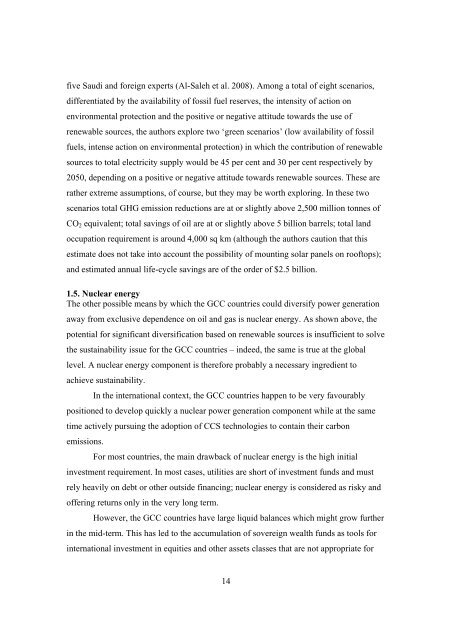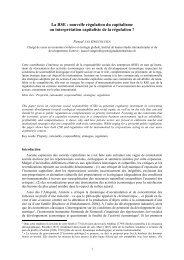PDF - Graduate Institute of International and Development Studies
PDF - Graduate Institute of International and Development Studies
PDF - Graduate Institute of International and Development Studies
Create successful ePaper yourself
Turn your PDF publications into a flip-book with our unique Google optimized e-Paper software.
five Saudi <strong>and</strong> foreign experts (Al-Saleh et al. 2008). Among a total <strong>of</strong> eight scenarios,<br />
differentiated by the availability <strong>of</strong> fossil fuel reserves, the intensity <strong>of</strong> action on<br />
environmental protection <strong>and</strong> the positive or negative attitude towards the use <strong>of</strong><br />
renewable sources, the authors explore two ‘green scenarios’ (low availability <strong>of</strong> fossil<br />
fuels, intense action on environmental protection) in which the contribution <strong>of</strong> renewable<br />
sources to total electricity supply would be 45 per cent <strong>and</strong> 30 per cent respectively by<br />
2050, depending on a positive or negative attitude towards renewable sources. These are<br />
rather extreme assumptions, <strong>of</strong> course, but they may be worth exploring. In these two<br />
scenarios total GHG emission reductions are at or slightly above 2,500 million tonnes <strong>of</strong><br />
CO 2 equivalent; total savings <strong>of</strong> oil are at or slightly above 5 billion barrels; total l<strong>and</strong><br />
occupation requirement is around 4,000 sq km (although the authors caution that this<br />
estimate does not take into account the possibility <strong>of</strong> mounting solar panels on ro<strong>of</strong>tops);<br />
<strong>and</strong> estimated annual life-cycle savings are <strong>of</strong> the order <strong>of</strong> $2.5 billion.<br />
1.5. Nuclear energy<br />
The other possible means by which the GCC countries could diversify power generation<br />
away from exclusive dependence on oil <strong>and</strong> gas is nuclear energy. As shown above, the<br />
potential for significant diversification based on renewable sources is insufficient to solve<br />
the sustainability issue for the GCC countries – indeed, the same is true at the global<br />
level. A nuclear energy component is therefore probably a necessary ingredient to<br />
achieve sustainability.<br />
In the international context, the GCC countries happen to be very favourably<br />
positioned to develop quickly a nuclear power generation component while at the same<br />
time actively pursuing the adoption <strong>of</strong> CCS technologies to contain their carbon<br />
emissions.<br />
For most countries, the main drawback <strong>of</strong> nuclear energy is the high initial<br />
investment requirement. In most cases, utilities are short <strong>of</strong> investment funds <strong>and</strong> must<br />
rely heavily on debt or other outside financing; nuclear energy is considered as risky <strong>and</strong><br />
<strong>of</strong>fering returns only in the very long term.<br />
However, the GCC countries have large liquid balances which might grow further<br />
in the mid-term. This has led to the accumulation <strong>of</strong> sovereign wealth funds as tools for<br />
international investment in equities <strong>and</strong> other assets classes that are not appropriate for<br />
14




